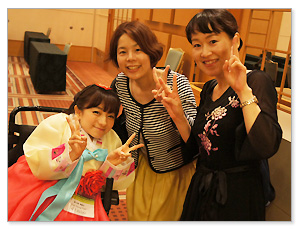- HOME
- Alumni News
- Park Yun Yeong (12th trainee)
- Yun Yeong's Final Report
Yun Yeong's Final Report
I am a Person with a Disability!
A Small Being-Me Before Arriving in Japan-
In Korea, in the fourth year of university education, I was considering myself as someone of negligible importance, someone of no value. I was born in Korea in 1986 with brittle born disease. My bones were so weak and broke very easily. It was normal for me to wear a cast and stay home at all times. My father drank every night and cried beside my bed. I was visiting a rehabilitation center every day to be able to walk, but even at the rehabilitation center my bones kept breaking. My mother was immensely sad to see me in this state and even wanted to run off with me somewhere nobody would know about us. From the very moment I was born, I kept causing troubles and worries to people around me. My disability was something that I had to work hard on, and something that I had to overcome.
When I was living like this, Park Chano, an ex-Duskin trainee, told me about the Duskin leadership training program. This was very fortunate to me. However, I did not have any special reason to apply. I just simply wanted to have a life that is new and different from the boring one I had. After the intensive interview, I was selected as one of the 12th trainees. As I knew people who were much more capable than myself applying and not getting in, at first I did not understand why I was selected.
Trainings I Had During the Ten Months
I received training in various locations over the course of ten months. For the first three months after arriving in Japan on August 30, I attended the Japanese language training. I had studied Japanese a little bit in Korea, so every day I went to a Japanese language school in Iidabashi on my own. I chose a class that was slightly too advanced for myself, being a little bit ambitious, but it turned out to be much harder than I thought – my classmates had all studied in Japan for more than a year. In class, we read newspapers and books, discussed Japanese economy and culture, and had to sit a test every day. It seemed like a piece of cake for the others, but not for me. I had to work hard everyday after school, with no breaks. For the first month I was seriously considering switching to another class of a lower level, but at the same time knew that I did not want to lose out. After a while I gradually started catching up with my class. I eventually became capable of not only managing my homework and discussions, but also delivering presentations better than anyone else in the class. In December, I passed the Japanese-Language Proficiency Test of N3 level, which was delightful. Now looking back on, I am glad that I did not give up.
In January, individual training started and all the trainees went to different locations for their own programs. I also had my individual training in various locations including Tokyo and Miyazaki. Below is a simple graph showing my individual training contents.
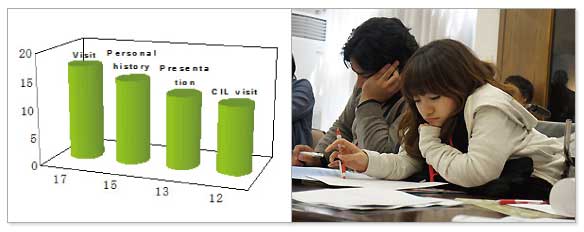
<Major Components of My Individual Training>
1) Visit : 17 places
2) Personal history : 15 persons
3) Presentation : 13 times
4) CIL visit : 12 locations
1. Visits
During the ten months, I visited 17 places including institutions and hospitals. I saw new prosthetic limbs and unique operation systems that different organizations had, which was very educational. Some places that I visited were housing all of a rehabilitation center, kindergarten and high school – perfectly equipped. In such places, however, I sensed an implicit message that persons with disabilities would not need to go out and should have a life in segregation, which made me a little bit sad from time to time.
2. Personal history
At the top of my wish list was to listen to personal histories of people. In fact, during the ten-month training, I managed to hear life stories of 15 people, including representatives and users of independent living centers. In Korea I had always stayed home, so here I wanted to meet as many people as possible and talk to them. I realized that even though the people I talked to had a commonality of having a disability, they approached it in very different ways. Personality and home environment as well as when and how disability was gained all contributed to shape one’s way of thinking and perspective on disability. So everyone I spoke to exhibited a unique view on their own disability. I also realized that everyone treasures something in her life and that this has to be sincerely respected. Moreover, I felt empowered when I was hearing personal histories of the leaders of independent living centers. It was a very meaningful training opportunity, wherein I began to see whom I wanted to become, and what kind of belief I wanted to have.
3. Presentations
I made a total of 13 presentations, including the speech I gave representing the 12th trainees at the opening ceremony of the program, a number of interviews, telling my personal history and the progress seminar talk. I had never had such opportunities in Korea, but during the Duskin training program, I had to speak in front of many people every time I completed a piece of training. The very first time I gave a presentation I was very scared, nervous and wanted to run away. I still feel a little nervous when giving a presentation, but can relax better than before. I am surprised at my own transformation as a presenter. Also I have discovered that I actually love talking in front of a lot of people.
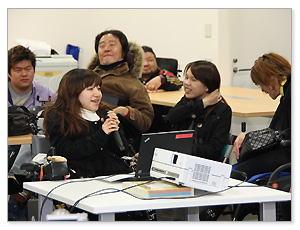
4. Visiting center for independent living (CIL)
I visited a number of centers for independent living, from independent living centers in Miyazaki and Kagoshima to the centers in Osaka (namely, the “MUCHU”, Mainstream Association, Aruru, and “Partner”) to Human Care Association in Tokyo. I also tried an independent living program (ILP), where a person with disability experiences a variety of daily chores like cooking and going outdoors, and acquires necessary skills for independent living. As I visited the centers, I began to see that while the basic concepts and services of the centers were consistent, there were regional differences across such centers. I think that it is possible to create a new center for independent living adapted to the Korean culture, built on the interesting projects and successful ideas of the Japanese centers.
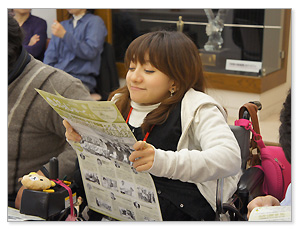
5. Other trainings
Apart from the aforementioned trainings, I did a variety of other training activities. I planned and implemented independent living projects myself, and went out to hear stories from the users of independent living programs. In addition, I attended an intensive two-week peer counseling course: on its last day, I took on the role of a leader and conducted a peer counseling session. In peer counseling, they say, you can rediscover the power within yourself through telling your stories to your peers. Indeed it worked for me: after the two weeks of intensive counseling, I reassured the power within me, and thereby liked myself as I was.
Also, as part of the independent living program I made many phone calls and wrote many reports on peer counseling, which got checked. These helped me improve my Japanese language skills.
As I have reviewed above, I studied a variety of things for the ten months. But my experience in Japan was not all about studying. There were lots of fun elements as well. I had my birthday in Japan and my friends organized a surprise party for me. In my training destinations, I visited famous sightseeing spots near the ocean and the mountains with people from my training organizations, and tasted local cuisines and delicacies. In the end, I have got more friends than I ever had in Korea. The best thing that happened to me in the ten months was that I now have Japanese friends whom I could talk to at any time even after I go back to Korea.
There were two occasions when I nearly gave up the training. The first time was the Japanese class, which was so challenging. The second time was the Great East Japan Earthquake. The earthquake on March 11 gave me the hardest time in the ten-month stay. Every day my worried family called me and said, “Come back to Korea immediately” and this made it difficult for me to focus on the training. I somehow had to convince my parents that I needed to continue my training. I promised them that I would always carry my passport with me (so that I could fly back to Korea if anything happened) and, with this condition, they let me carry on with my training. This made me even more determined to successfully complete the training program. I felt bad for my worried family, but I tried to concentrate on my work because this was what I wanted to do. I also wanted to be useful in any possible way, so every week I volunteered in a fundraising activity to help people with disabilities in tough circumstances.
As mentioned above, I had two very hard times during the ten months, but persistently carried on with my training until the end of it, believing in myself and in my decisions. I think that the second challenge especially strengthened me. I am really glad that I did not give up and go back home then.
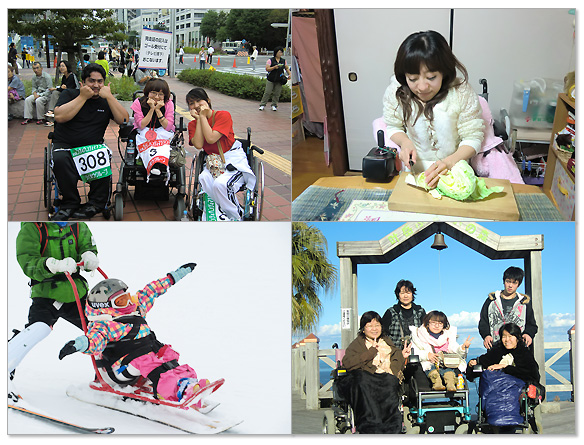
Disability is Not Something Negative-The Place That Changed Me (The Independent Living “MUCHU” Center)
I attended trainings in a variety of locations over the ten months. In particular, I was lucky to have a three-month training at Independent Living “MUCHU” Center, because I learned the new perspective toward disability and people with disabilities.
The representative of the Center, Mr Yasuyuki Hirashita, always told me, “Being disabled doesn’t mean you have to try harder.” This phrase gave me so much reassurance. I remembered having used to feel guilty towards my parents whenever my bone broke, even though it was due to my disability and never my fault. I also remembered having hated myself whenever people told me, “You should work harder than anybody else as a disabled person” but I could not satisfy them as I could not last long and got easily tired. I realized that I had always pushed myself to my limit and suppressed my desires on so many occasions.
Despite what Mr Hirashita said, it was not easy to free myself from the obsession of having to try hard. First, I would need the courage to admit that there are things that I can do and things that I cannot do. At MUCHU Center, all the members, disabled and non-disabled, are like friends. If there is something you need help with, you call out for help and someone comes along to help you out. But at first, I was too embarrassed to ask for help. I wanted to try and see if I could do it myself before asking for help. But, as I gradually got used to the life at MUCHU, and began to understand the essence of Mr. Hirashita’s message, I was finally able to call out for help every morning when I arrived at MUCHU.
Also, for the first time in my life, I realized that a disability can be entertaining. This made my experience at MUCHU even more meaningful. One day Mr. Hirashita appeared on TV. Anyone would think that he must be feeling bad about his appearance – he was very short and had a bulging tummy – but, to my surprise and shock, he showed his tummy and made fun of himself, making everyone laugh. The reason that the word “disability” sounds gloomy is because we think that disability is something negative, something that should be hidden away. But once we know that a disability can be a unique characteristic of the person, the negative connotation vanishes, and we can have a positive image of people with disabilities. In order to change how society views people with disabilities, Mr. Hirashita has been engaging himself in a variety of activities: he published picture books and coordinates theater performances. At MUCHU, I was finally able to view my disability as something positive.
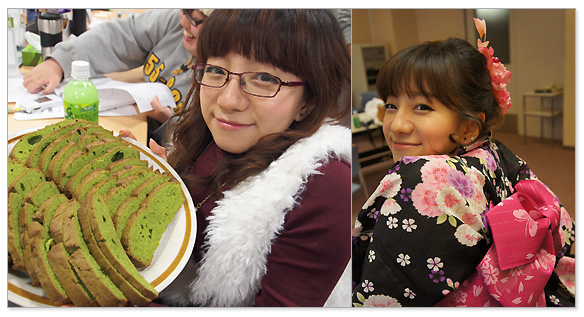
When I Am Back In Korea…Me After Returning Home
All the training has finished, all that is left now is the journey home. I have a lot of worries as well as a lot to look forward to. I am worried about facing the harsh reality in Korea, where I will probably face a number of difficulties and things will not go as I plan. However, I have developed so many dreams and ideas throughout the leadership training. I now know that what is most important is to believe in myself and pursue things until I succeed. So I look forward to going back home.
1. Creating a fun program for independent living
It is important for a disabled person to have a strong will, if the person wants to start living independently. It starts with consultations with professionals, but the most important thing I found was the independent living program. I thought that, in order to make the independent living program a fun experience, it was important for someone with great anxiety and fear about independence to not just experience errands needed for independent living, but also to be involved in cultural activities with others. If the start of independent living turns out to be unpleasant, the meaning of living independently itself could lessen. Independent living program is not just a one-off experience: it is something that continues even after one becomes independent, after meeting and making peers. I would like to get together with everyone to make enjoyable independent living programs.
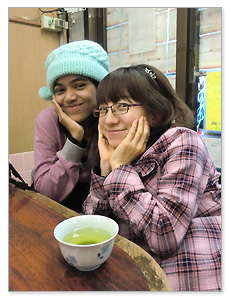
2. Heartfelt Leader
In the leadership training in December 2010, my teacher Mr. Yoshizumi Ikenori told me, “A leader is not someone who walks in front of you, or behind you. A leader is someone who walks by your side.” Mr. Hirashita at Independent Living “MUCHU” Center also told me, “Someone who is strong in the true sense is someone who is kind.” I would like to be a kind and strong, and strong and kind, leader who listens to everyone attentively.
3. Reporter
For some time, I have been having a wish to be someone who can communicate information in the manner people can understand it very easily. After I listened to the personal history of 15 people, and giving 13 presentations to large audiences, I began to think that I wanted to become a reporter. I would like to work hard towards this dream, even though I am aware that there may be a long journey ahead of me.
Summary
Everyone is unique and has power to influence others but may not be aware of it. I was one of them. But after my ten-month experience as a Duskin trainee, I regained the power I had always had within myself – and here I am now.
Through the ten-month training, I learned that I could help other people despite my disability and that I could gallantly and respectably live in society. I also became able to see disability more positively. If I ever meet disabled people in Korea who think that disability is something negative, I would like to help them grow a positive view on it, so that they will be able to like themselves better.
My heartfelt thanks go to everyone at the Duskin Ainowa Foundation, Japanese Society for Rehabilitation of Persons with Disabilities, and everyone who hosted me at various training destinations. Thank you so much! I will work hard after going back to Korea (But, of course, I will not work on my disability, ha ha!).
